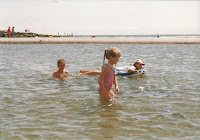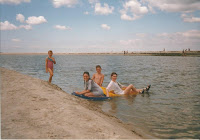To continue with our day trip motif, have you ever visited the sea shore or any lake beach? My children are beach bunnies. They love sand, surf, and sun. We have the good fortune of my husband’s parents living in Stone Harbor, New Jersey. A beautiful home, with an upstairs for noisy family visitors.
 |
| The Lees crew at the point in Stone Harbor, New Jersey. |
Stone Harbor shares its sandy barrier island with Avalon, another beach town. Visiting my in-laws gave us the luxury to hike the point in Stone Harbor often. The point is the tip of Stone Harbor and Hereford’s Inlet between Stone Harbor and the Wildwoods.
Just like when we go camping with five kids, when we’re down the shore, we remind our children that we’re visitors to other creatures’ habitats and need to respect both the creatures and their homes. Our family always gets excited when we see a new sea animal at the beach.
The best time to visit the point is during low tide. Here in New Jersey, low tide occurs about every 12 hours and 20 minutes or so. Tides are primarily caused by the moon. There is an excellent short video about what causes tides at science.howstuffworks. https://science.howstuffworks.com/environmental/earth/geophysics/tide-cause.htm Look toward the bottom of the blog for the video on tides.
Now on this particular journey to the point, our family found the most interesting animal. When the tide goes out at the point, it leaves behind tidal pools. On this occasion, the pool was about three feet deep. As we and other families were wading through, kicking and splashing each other, I noticed a dark, round object gliding just beneath the surface.
“Everyone out of the water,” I told my family.
“Mo-om,” our son protested. [There’s always one!]
“Look!” I pointed to the dark shape, and the children scampered up the sand bank.
“What is it?” Our oldest daughter asked.
Good question. Other families heard me and left the water, too. As I watched the animal glide through the water, I realized we were looking at stingray. Gracefully, it seemed like he was flying through the water. The white edges of its water wings curled and flapped under the sea. We watched in wonder. The stingray we saw was about the size of a large roundish platter, with its stick of a tail poking straight out its back. Here’s an informative short video of swimming stingrays at the National Geographic site.
Again, we reiterated to our children how you do NOT touch or approach wild animals—even ones found in the sea. Seriously, I thought other people understood this. Unfortunately, one father, who told his family to step out of the tidal pool, went back into the pool to try and lift up one side of the stingray.
I couldn’t believe this! Everyone watched from the banks of the pool. Think about the animal’s name, I thought to myself. It’s a STINGray. Suddenly, the gentleman screamed out in pain, holding both his hands palm up as he hurried to the sandy bank and his family. I couldn’t help myself. I scooted closer to his family and saw the angry red blister-like marks on his fingers. I guessed he was stung by the ray’s wing edges.
“Never, never touch wild animals in their habitat,” I told my children. The stingray may have looked docile, but I didn’t know where the “sting” part of the animal lay. Apparently, there are stingers at the edges of its wings.
The children couldn’t wait to get back to Gram and Pop’s house to tell them about seeing the stingray. We all learned a valuable lesson that day. And, unfortunately, so did that father and his family—the hard way. Poor thing! I wondered if he needed to have stingers taken out or just the wounds treated.
Thanks for visiting Camping with Five Kids. I hope you’ve had a great summer, too. Please leave a comment about your favorite trip to a beach or the shore.


Hi Victoria Marie – what a great teaching post … and yes lesson learnt for your family, while that chap might remember in future. Your in-laws sound as though they've got a wonderful set up for you all – lovely memories ahead for the kids – cheers Hilary
Most definitely lovely memories ahead at the beach. Thank you so much, Hilary, for visiting Camping with Five Kids. It is such a pleasure seeing your cheery face every month.
I hope you've had a wonderful summer. Again, thanks for your comment at Camping with Five Kids. All best to you!
They do let you pet the backs of the stingrays at SeaWorld, so I think that side of them is safe. Still, you're right about that. Don't mess with wildlife. =)
Yes, Crystal, at our Camden Aquarium the kids can touch the back of the stingray also. They do look so gentle as they glide through the water, but you should never touch one out in the wild. I'm always telling my kids that we are in their home now.
Thank you so much for visiting Camping with Five Kids. It’s always a pleasure seeing you here.
I hope you and your family have had a wonderful summer. Thanks again for your comment at Camping with Five Kids. All best to you!
The Australian zookeeper and television personality Steve Irwin was killed by a stingray, albeit a large one, while swimming with it he was pierced in the heart by its barbs.
Yikes! Oh how horrible, Bill. I never could understand why people don't realize that wild animals will always be wild, especially in their own habitat. What a frightening thing to happen to Steve. Gosh! I hope it wasn't caught on tape.
I truly appreciate all your comments here at Camping with Five Kids. I hope your summer went well. All best to you, sir.
My son loves going to the beach. He loves the Sand too. It is always important to respect wildlife. That father definitely learned a valuable lesson that day. Great post!
Thank you so much for your kind words, Michelle. I really appreciate them. The beach is a great place to explore–especially with young children. Yes, that father learned a truly valuable lesson–the hard way. The best thing parents can teach their children is NEVER to touch wild animals in their habitats.
Thank you so much for visiting Camping with Five Kids. It’s always a pleasure seeing you here. I hope you and your family have had a wonderful summer. Thanks again for your comment at Camping with Five Kids. All best to you!